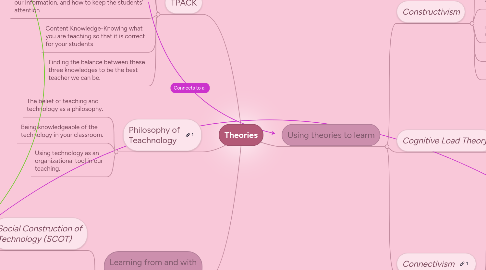
1. TPACK
1.1. The belief that we use three different kinds of knowledge to be a teacher. Teaching Knowledge, Pedagogical Knowledge and Content Knowledge.
1.2. Technology knowledge-knowing how to use technology as a tool to transfer the information
1.3. Pedagogical Knowledge-Knowing how to teach our information, and how to keep the students’ attention
1.4. Content Knowledge-Knowing what you are teaching so that it is correct for your students
1.5. Finding the balance between these three knowledges to be the best teacher we can be.
2. Philosophy of Teachnology
2.1. The belief of teaching and technology as a philosophy.
2.2. Being knowledgeable of the technology in your classroom.
2.3. Using technology as an organizational tool in our teaching.
3. Learning from and with technologies
3.1. Social Construction of Technology (SCOT)
3.1.1. The belief that it is human action and society that shapes technologies as they are developed.
3.1.2. Using technology to create a social network to benefit us in our everyday learning
3.1.3. It is variant and changing, your work is only a scratch on the planet
3.2. Media Ecology
3.2.1. The belief that it is technology who influences humans and society
3.2.2. Media Ecology tells us that codes and the web influences our everyday lives
4. Using theories to learm
4.1. Constructivism
4.1.1. The belief that when we learn, we are building upon our previous knowledge, we learn autonomously and actively.
4.1.2. the student is malleable and able to learn more, to prioritize some information over other
4.1.3. Learning is a collaboration. Negotiate and discuss meanings and find solutions through shared understanding
4.1.4. Personal experience for learning
4.1.5. LEGO!!
4.2. Cognitive Load Theory
4.2.1. The belief that our memory has a limited work space and is limited in information and operations it can hold and perform.
4.2.2. Finding a balance between OVERload and UNDERload
4.2.3. teachers must find an organized way to pass on new information (PREZI)
4.2.4. To give new information slowly and efficiently to avoid overloading the students.
4.3. Connectivism
4.3.1. The belief that we make connections with the world rather than keep our knowledge contained in the brain.
4.3.2. Staying connected, creating a web, because that's where knowledge is found.
4.3.3. always looking for connections between information
4.3.4. teachers help the student store the information by creating connections
